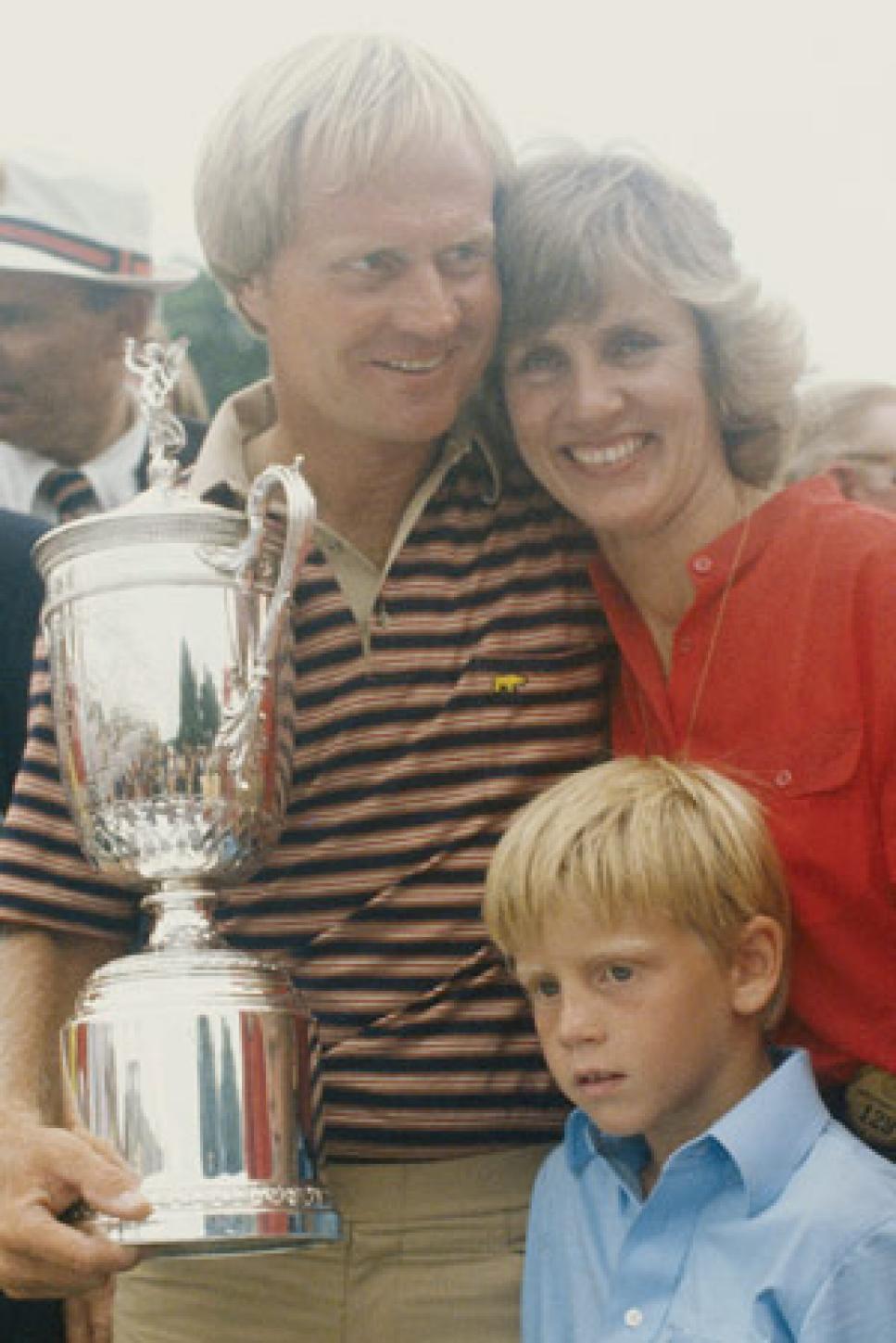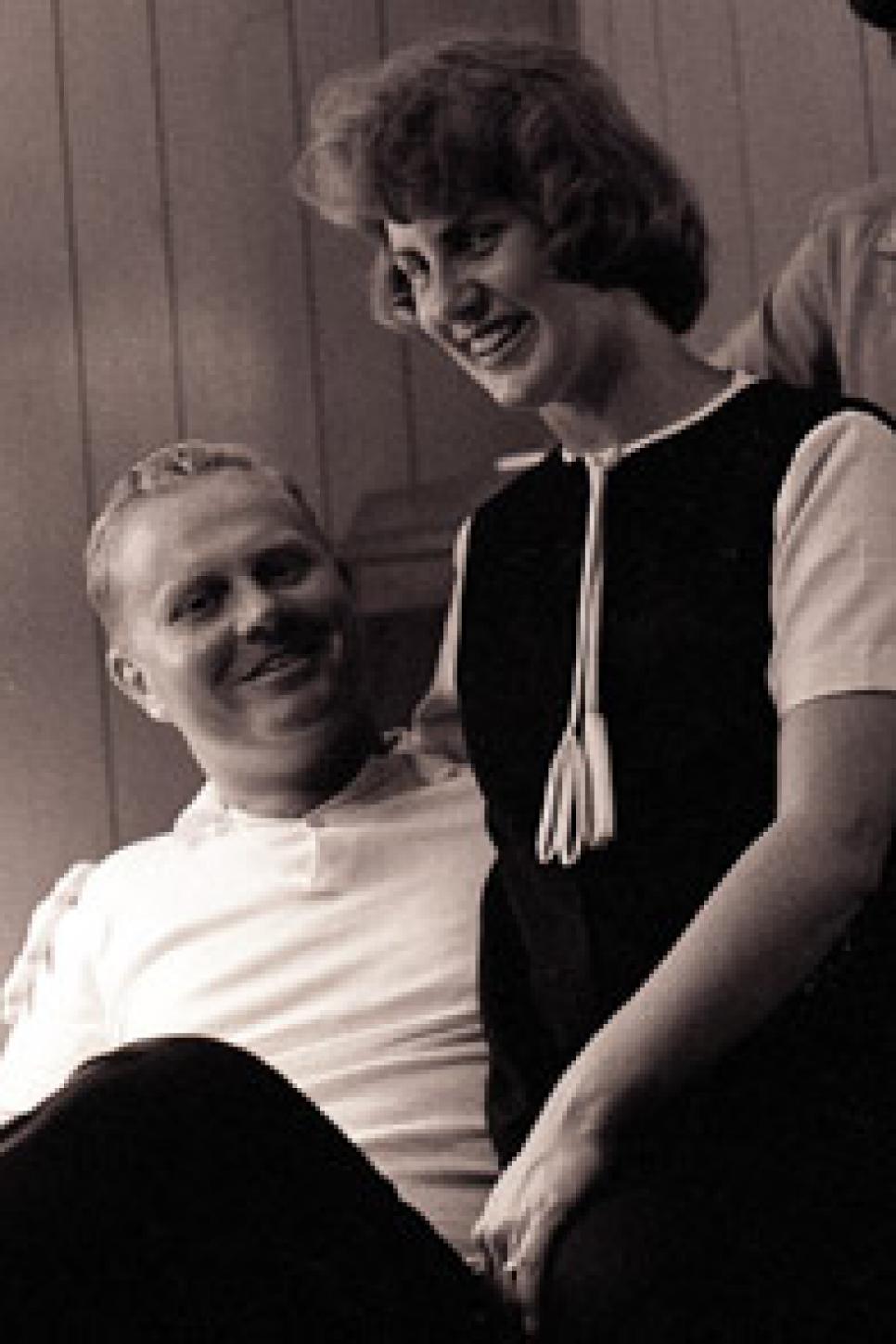News
In His Own Words: Family

Baltusrol portrait: 1980 U.S. Open.
The following day little Jackie came out to help me. He putted with me on the practice green at La Quinta, and he knows exactly how to go about it. He puts the ball down about four inches from the cup, and knocks it in from there. Wait until he runs into those long six-inchers.
[Sports Illustrated, 1964]
After playing an exhibition yesterday, Jackie this morning asked me to play golf this afternoon. I said, Jack, not today. He's 9½ and he shot 50 yesterday. He's been shooting in the 50s for a long time, but this was his first 50. He can carry the ball about 150 yards. He came home yesterday, proud of his score. Barb said, How did you do? And he said -- there are two or three bags of balls that he hits at weekends -- he said, Mom, all those years of practice finally paid off. I think that's one of the greatest lines.
[Interview transcript with Golf Digest, 1971]
I believe I'm pretty good with the kids, but for some strange reason, I'm not the first time I see them. When Barbara went to the hospital in Columbus to have Jackie, I was out of town playing a match. I rushed home and out to the hospital. A nurse carried my new son out so that I could see him, and as I was walking forward, I sank to the floor and collapsed. Another nurse revived me with smelling salts. Terrific! When Stevie was born, I waited patiently at the hospital and then when he was brought out, I collapsed -- another gutsy performance.
[Jack Nicklaus with Herbert Warren Wind. The Greatest Game of All: My Life In Golf. New York: Simon & Schuster, 1969]
Whenever you're playing with a fellow who has one of those days when putts are falling for him all over the greens, you always get to wondering if his method, whatever it is, isn't the only way to putt. I can provide you with one classic illustration. The other day, after I had played nine holes with my wife Barbara and had watched her roll one sizable putt after another right in to the center of the cup, I was even ready to change over to her method. It features an awkward stance, faulty alignment, a spread grip with the right thumb off the shaft, a fast backswing followed by a jerky forward stroke on which her head bobs up as the blade bounces off the turf before the ball, and finally an irritating [Tommy] Bolt-like strut as the ball plinks into the cup and she walks forward to retrieve it.
[The Greatest Game of All]
I made a vow very soon after turning pro that, unless I could have Barbara and the children along with me, I would never be away from home for more than 14 days at a stretch. Over the years, this has caused some traumas for a lot of good people in golf and among my business associates, not to mention the stress I have experienced as a result of the problems I've caused them. Also, I know a certain proportion of the media, along with some of golf's other camp-followers, think I'm overzealous about putting my family first. Be that as it may, the result has been a strong and secure marriage, plus five temperamentally different but basically normal, generally healthy, and -- I sincerely hope -- reasonably happy children. Case closed.
[Jack Nicklaus with Ken Bowden. My Story. New York: Simon & Schuster, 1997]
As with so many things in my makeup, the answer derives from Charlie Nicklaus. My father taught me the single hardest thing a professional athlete has to learn, which is how to lose gracefully. Dad convinced me very early in my involvement with sports that I had to accept the bad with the good; that, however much it hurts inside, you smile and keep a stiff upper lip; that you shake the hand of the man who's beaten you, and tell him congratulations, and mean it.
[My Story]

Barbara, in fact, has always believed that I only came to full maturity after my father's death, and I know now that she is right. I would hardly ever make any kind of decision without talking to my dad, phoning him day and night for his thoughts on even the most minor personal or family or golfing matters. With most of my business decisions then being made by Mark McCormack, there had never been much call on me for analysis or decisiveness; everything was laid out almost too easily. Then, boom, Dad was gone and suddenly I had to grow up. It may seem a strange thing to say, but all these years later there is no reason not to face the truth. Even in his final days my father did me one last great service. As his decline continued, and knowing there was no hope, the emotion that surfaced more and more as I thought about our lives together was guilt. It hit me hardest after losing a playoff in San Diego a few weeks before he passed on. Here was a father who had done so much for his son, who had seen what he believed to be a rare potential and who had struggled and sacrificed so selflessly to help make that vision come true, and here now was the son, grown complacent, faltering, taking the easy way out, accepting second best, trying to get by on God-given talent alone.
[My Story]
Gary was 14 and playing in an age-group golf tournament. An ESPN reporter stuck a microphone in his face and asked, "Are you going to follow in your father's footsteps?" I thought Gary's answer was perfect. "How do I know?" he said. "I'm only in the ninth grade."
[My Story]